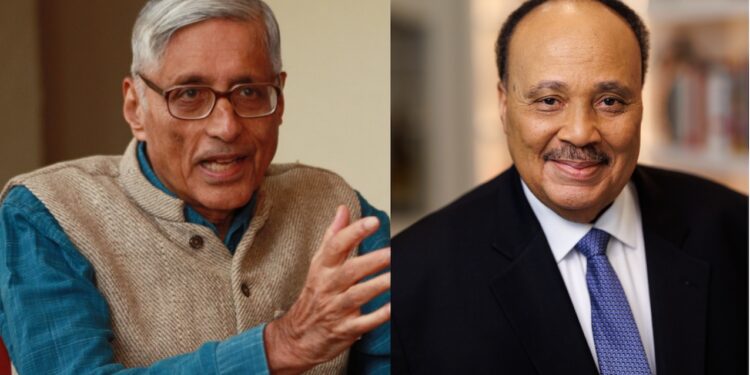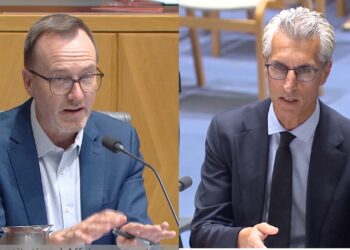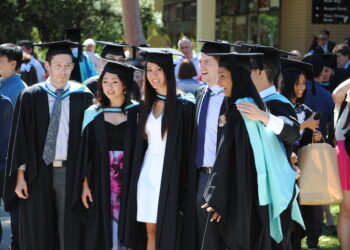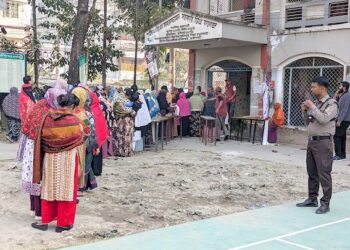In a powerful joint statement that bridges continents and decades of civil rights legacy, Rajmohan Gandhi—grandson of Mahatma Gandhi—and Martin Luther King III—son of Dr Martin Luther King Jr—have issued an urgent humanitarian appeal for an immediate ceasefire in Gaza and the safe release of all hostages.
The two descendants of history’s most influential advocates of non-violent resistance spoke “not only as descendants” of their legendary forebears “but as members of a human family wounded by the unfolding humanitarian catastrophe in Gaza.”
Their statement, released amidst ongoing conflict in the region, calls for unrestricted humanitarian aid to reach Gaza’s civilians whilst acknowledging the “deep pain of Israeli families whose loved ones remain in captivity.”
“The children of Gaza are our children. The Israeli hostages held in fear and silence are our family,” the statement declared, invoking the universal human bonds that transcend political and geographical boundaries.
Invoking the Philosophy of Non-Violence
The joint appeal draws heavily from the philosophical foundations laid by both Gandhi and King Sr, with the authors quoting Mahatma Gandhi’s words: “I object to violence because when it appears to do good, the good is only temporary; the evil it does is permanent.”
They also referenced Dr King Jr’s famous assertion that “Injustice anywhere is a threat to justice everywhere,” arguing that sustainable peace in the Middle East cannot be built “on the rubble of broken bodies and shattered trust” but must rise “from the dignity of every human being, Israeli and Palestinian alike.”
The statement calls upon world leaders and regional actors to pursue “courageous diplomacy, rooted in justice and compassion” rather than vengeance, emphasising that whilst “the road to reconciliation will be long,” it must begin “with the first steps of mercy and moral clarity.”
About the Authors
Rajmohan Gandhi is the grandson of Mahatma Gandhi, India’s father of the nation who led the country’s independence movement through non-violent civil disobedience. Mohandas Karamchand Gandhi, known as Mahatma Gandhi (1869-1948), pioneered satyagraha—the philosophy of non-violent resistance—which became a model for civil rights movements worldwide.
Rajmohan Gandhi, 89, is a distinguished author, historian, and former member of the Rajya Sabha (India’s upper house of Parliament). He has written extensively on his grandfather’s life and philosophy, including acclaimed biographies such as “Gandhi: The Man, His People, and the Empire.” A former research professor at the Centre for South Asian and Middle Eastern Studies at the University of Illinois, he has dedicated his career to promoting interfaith dialogue and peaceful conflict resolution.
Martin Luther King III is the eldest son of Dr Martin Luther King Jr, the legendary American civil rights leader who championed racial equality through non-violent protest. Dr King Jr (1929-1968) led the American civil rights movement from the mid-1950s until his assassination, becoming one of the most influential figures in modern history through his advocacy for racial justice, economic equality, and opposition to war.
Martin Luther King III, 67, has continued his father’s legacy as a civil rights activist and advocate for social justice. He served as president of the Southern Christian Leadership Conference, the organisation co-founded by his father, and has been involved in numerous humanitarian and civil rights initiatives. He currently serves as chairman of the Drum Major Institute, which promotes Dr King Jr’s vision of economic and social justice.
A Legacy of Peace
The joint statement represents a rare moment of unity between the inheritors of two of the 20th century’s most significant movements for social justice and human rights. Both Mahatma Gandhi and Dr King Jr drew inspiration from each other’s work—King Jr explicitly acknowledged Gandhi’s influence on his philosophy of non-violent resistance.
The authors concluded their appeal with a call to “rise above division, hatred, and despair” and affirm “that a just peace is not only necessary, but possible,” embodying the optimistic vision for human dignity that both their ancestors championed.
Their intervention comes as international pressure mounts for a resolution to the conflict that has resulted in significant casualties and a humanitarian crisis in Gaza, whilst Israeli hostages remain in captivity.











